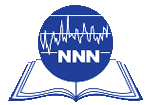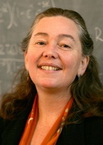NUMERACY
Len Vacher (pictured above) is the founder and co-editor of Numeracy — the new peer-reviewed publication of the National Numeracy Network.
 Numeracy: E-Journal
Numeracy: E-Journal
Numeracy is an open-access, peer-reviewed journal launched in 2008. Numeracy aims to support education at all levels that integrates quantitative skills across disciplines. The journal seeks evidence-based articles. See Vacher's NECQL and PKAL presentations.

 Numeracy Editors
Numeracy Editors
Len Vacher (left) and Dorothy Wallace (right) are editors of Numeracy: Advancing Education in Quantitative Literacy. Numeracy is published by the National Numeracy Network, supported by the U. of S. Florida Libraries and hosted by the Berkeley Electronic Press™.
2010 Volume 3: Issue 1
- Five Thousand Downloads by H L Vacher (Editor of Numeracy)
- Confessions of a Weak Tie by Joel Best
- A Rubric for Assessing Quantitative Reasoning in Written Arguments by Nathan D. Grawe, Neil S. Lutsky, and Christopher J. Tassava
- Envisioning a Quantitative Studies Center: A Liberal Arts Perspective by Gizem Karaali, Philip I. Choi, Sara Owsley Sood, and Eric B. Grosfils.
- Are Statistics Labs Worth the Effort?—Comparison of Introductory Statistics Courses Using Different Teaching Methods by Jose H. Guardiola, Nadina Duran-Hutchings, and Hassan Elsalloukh
- An Activity Promoting the Practice of Quantitative Literacy for Pre– and In–Service Teachers of Mathematics and Science by Timothy L. Sorey, Teri Willard, and Duane Sholz.
- College Algebra in Context: A Project Incorporating Social Issues by Michael T. Catalano
- Numeracy: Open-Access Publishing to Reduce the Cost of Scholarly Journals by Todd A. Chavez
- Book Reviews of “What the Numbers Say” and “The Numbers Game”. Reviewed by Robert G. Root
- Parts of the Whole: Observing the State of the System. Editorial by Dorothy Wallace (Editor of Numeracy)
2009 Volume 2: Issue 2
- Assessing Quantitative Reasoning by Corrine Taylor, NNN President. [On Dartmouth's attitude assessment] “I hope that more institutions will also adopt this excellent (and carefully tested) instrument [for assessing students’ changes in attitudes after having taken QR coursework. For assessing students’ QL skills, I am impressed with the variety of instruments that have been developed and are being tested—each for different specific purposes. Here I briefly describe three...” “JMU’s QR Test is narrow and deep.” “The AAC&U’s QL rubric, in contrast to the JMU test, is much broader in scope.” [No evaluation of Carleton's rubric for assessing QR.]
- Integration with Writing Programs: A Strategy for Quantitative Reasoning Program Development by Nathan D. Grawe and Carol A. Rutz. “One of the most common and frustrating objections to QR programs in higher education is that the subject matter is entirely remedial...” “The interdisciplinary nature of QR represents one of the greatest challenges to effective programming.” “Framed as a necessary rhetorical tool, QR became immediately relevant to the entire campus.” “Finally, collaboration with the Writing Program has helped us surmount institutional inertia.” “No matter how beneficial the cooperative approach may be for a QR initiative, writing programs must be convinced that integration serves their goals as well.” “Readers should think seriously about the tradeoff between across-the-curriculum participation and the importance of a strong methods emphasis when considering adoption of QuIRK’s model of programming.” “Our experience has convinced us that engaging faculty directly in the assessment of student work provides the impetus for curricular change. The examination of QR in student work also offers us the chance to show colleagues in traditionally nonquantitative disciplines how QR may be relevant to their courses.” “;Designing an effective QR program is inherently challenging due to the interdisciplinary nature of the subject.”
- Quantitative Literacy Assessments: An Introduction to Testing Tests by Dorothy Wallace, Kim Rheinlander, Steven Woloshin, and Lisa Schwartz. “To formally assess content validity of the MDIT, Woloshin and Schwartz asked 20 Dartmouth Medical School faculty who teach evidence-based medicine (but were not involved in the study) to complete the data interpretation test and then formally rate its content validity using criteria derived from Feinstein’s Index of Sensibility (Feinstein, 1987). Specifically, they were asked to rate the clarity of the test items, how well the data interpretation test covers the important concepts in the domain of critical reading skills, and whether a person scoring poorly on the test would have very limited ability to interpret medical data.”
- Measuring Resource Inequality: The Gini Coefficient by Michael T. Catalano, Tanya L. Leise, and Thomas J. Pfaff
- Engaging Math-Avoidant College Students by M. Paul Latiolais and Wendi Laurence
- Book Review of Calculation vs. Context: Quantitative Literacy and Its Implications for Teacher Education by Bernard L. Madison and Lynn Arthur Steen (Editors). Reviewed by Maura B. Mast. In reviewing Schield's paper: Schield recommends “the establishment of alternatives (in the form of QL or Statistical Literacy) to Algebra II at the high school level. This is an excellent suggestion and is perhaps the most practical way to bring QL into the pre-college curriculum. Such a course is ideal for students in their fourth year of high school who are not planning to go into a quantitative-based major in college (or perhaps who are not even planning to go to college).” In reviewing the papers by Taylor, Lutsky and Best: “One interesting aspect of these three essays is the set of opinions about who should teach QL and what that means. Best clearly wants to bring it out of the mathematicians’ hands and position it (as its relates to critical thinking) across the curriculum; Lutsky agrees, with his own perspective that QL is central to building and evaluating arguments, and also sees a natural place for this in many different disciplines. In contrast, Taylor views the responsibility for developing QL skills as resting primarily on the mathematics teachers, but calls for reinforcement and support from teachers in quantitative disciplines and in English.”
- Book Review of Stat-Spotting: A Field Guide to Identifying Dubious Data by Joel Best. Reviewed by Joe Swingle. “Stat-Spotting is a practical, do-it-yourself manual for detecting questionable claims reported in the media. Using examples drawn mostly from mass media sources, Stat-Spotting provides readers with a number of useful tips for identifying potentially problematic statistics. The author’s skillful analyses and explanations presented in clear and concise prose make Stat-Spotting an ideal guide for anyone who reads a newspaper, watches television, or surfs the Web. In short, everyone.”
2009 Volume 2: Issue 1
- Editorial: All the More Reason for QR across the Curriculum. Bernard L. Madison “College mathematics enrollments, although generally increasing, have lagged behind overall college enrollments.”
-
Confronting Challenges, Overcoming Obstacles: A Conversation about Quantitative Literacy.
Bernard L. Madison and Lynn A. Steen.
“I teach a course now that is the first real general education course in mathematics on our campus.” - Establishing the Quantitative Thinking Program at Macalester. David Bressoud: “Money is important. The task was much larger than anyone envisioned. For those who would seek to create a program in Quantitative Reasoning at their own college or university, my advice would be to first articulate your goals in a language that makes sense for your institution, keep in mind the lessons learned at Colby-Sawyer and Macalester, and remember that an effort like this is only do-able and worthwhile if it is something you care deeply about and enjoy.”
- The Case for Infusing Quantitative Literacy into Introductory Geoscience Courses. Jennifer M. Wenner, Eric M. Baer, Cathryn A. Manduca, R. Heather Macdonald, Samuel Patterson, and Mary Savina.
- Quantitative Literacy on the Web of Science, 2 — Mining the Health Numeracy Literature for Assessment Items. H L. Vacher and Todd Chavez
- Book Review: Review of The Chicago Guide to Writing about Numbers by Jane E. Miller. Review by Neil Lutsky. “Although navigating the book as a whole can be challenging, each of the worlds the reader encounters when doing so offers an abundance of resources. The guidance each chapter provides is spot on.”
- Columns: Parts of the Whole: Is Everything Equally Important? Dorothy Wallace.
2008 Volume 1: Issue 2
- Abstracts for Numeracy by Len Vacher (co-editor)
- Quantitative Literacy on the Web of Science, 1: The Bibliography and its Role in the History of this Journal by Len Vacher and Todd Chavez
- Quantitative Literacy Across the Curriculum: A Case Study by Benjamin Steele and Semra Kiliç-Bahi.
- Using Local Data To Advance Quantitative Literacy by Stephen Sweet, Susanne Morgan, and Danette Ifert Johnson
- False Positives and Referral Bias: Content for a Quantitative Literacy Course by Stuart Boersma and Teri Willard
- Perspectives: Word Problems: Reflections on Embedding Quantitative Literacy in a Calculus Course by Gizem Karaali.
2008 Volume 1: Issue 1
- The Scope of Numeracy by Len Vacher and Dorothy Wallace (co-editors)
- Evolution of Numeracy and the National Numeracy Network by Bernard L. Madison and Lynn Arthur Steen “In recent years quantitative literacy has received increasing attention, in part because it is most notably lacking and most critically needed.” “The interdisciplinary focus of NNN sets it apart, making it an interest of many but a passion of a few, much akin to its cause — quantitative literacy.”
- Scientifically Based Research in Q/L: Guidelines for Building a Knowledge Base by Richard Scheaffer
- Teachers Talk: Pressure Points in the K-8 Mathematics Curriculum by Rheinlander, Wallace, Morrison, Ansari, Coch and Williams
- Development of Case Stories by Interviewing Students about their Critical Moments in Science, Math, and Engineering Classes by May et al.
- Perspectives: Birds–Dead and Deadly: Why Numeracy Needs to Address Social Construction by Joel Best (Author of StatSpotting) “This paper argues that numeracy education needs to address social construction.” “Any serious effort to make students more numerate about those statistics requires coming to terms with this process of social construction.” “Social construction poses a challenge for those interested in promoting numeracy. Once we acknowledge that all numbers are products of social activity, we must confront the nature of the social environment in which numbers emerge and circulate. And that means moving numeracy education beyond the confines of teaching calculation and statistical concepts, to address matters of social construction.”
- Review of The Triumph of Numbers by I. B. Cohen by H L. Vacher.
In 2011, Bernie Madison gave the opening talk at the NNN meeting in Ashville NC. Here is a video of this talk. Videos: WMV 56kbps FLV

